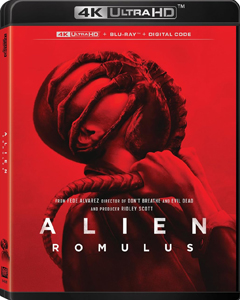Legacy sequels have become such an ingrained aspect of Hollywood that we’re inured to them, and cynically assume they’ll at best have a few moments that call to mind the source material’s greatness before they leave our brains completely. We’ve forgotten the intended appeal, so when a film like “Alien: Romulus” comes along that totally achieves its aims, it’s a revelation.
This 14th film in the “Aliens/Predator” saga is like if Ridley Scott had wanted to do a follow-up right after the 1979 original. He’s a futurist, though, so he moved on to his new futurism of “Prometheus”/“Alien: Covenant” in the 2010s.
Nostalgic futurism
Fede Alvarez, born one year before “Alien” came out, is a nostalgic futurist – enjoying the incongruous but compelling idea of the future through the lens of the 1970s. (Nostalgic futurism is even more prominent in another Scott franchise, “Blade Runner.”) The director/co-writer makes “Romulus” like one of those 2019 “Alien” anniversary fan shorts except with $80 million to play with instead of a few bucks.
“Alien: Romulus” (2024)
Director: Fede Alvarez
Writers: Fede Alvarez, Rodo Sayagues
Stars: Cailee Spaeny, David Jonsson, Archie Renaux
With his regular co-writer Rodo Sayagues, Alvarez proves himself to be a fan and scholar, smartly incorporating aspects of “Alien” (the standard shipborne plot), “Aliens” (an amazing zero-G battle of a horde versus a Big Gun), “Alien 3” (the heroes are criminals) and “Alien Resurrection” (the creepy-ass combo of alien and human DNA).
Plus, “Romulus” serves as the third of what was once intended to be Scott’s “Prometheus” trilogy, continuing with that godlike experimentation. (This film takes place after both “Covenant” and “Alien,” but before “Aliens.”)
Although not as much of a slow-burn as “Alien” – it can’t be, because we’re overly familiar with the alien life cycle – “Romulus” takes its time to build characters and create a natural plot. Weyland-Yutani (a.k.a. The Company) essentially is The Government, especially on colony planets.
When Rain (the amazing Cailee Spaeny, calling to mind early Ellen Page) earns enough work credits to get shipped to a better colony, she’s rejected; the Company has increased the number of credits required. But it assures her it really appreciates her contributions to the Company.
Humans and androids gotta stick together
Rain’s relationship with her “brother,” the android Andy (David Jonsson, also great), gives us something more personal for the “Alien” saga – although, granted, other sci-fi sagas (see “Terminator 2”) thoroughly explored robots with humanity in the wake of Scott’s original.
“Romulus” explores autism via Andy, and the idea that he can’t control it via the concept of programming discs plugged into his neck. The saga’s androids have tended to be “Others” – just a little outside the group – but Rain loves her brother.
This makes it all the more wrenching when he follows his programming and makes decisions that are brutally logical, decisions no human would ever make – especially in a heroic action film – such as leaving a colleague to the xenomorphs’ mercy because it’s what’s good for the group.
One quibble is that the crew of the Corbelan IV don’t initially distinguish themselves as individuals, but I’m curious to see if on rewatches they grow on me like the Nostromo’s crew did on every “Alien” rewatch. Fears that they are just Gen-Z xenomorph fodder are valid early on. (Some of the actors are likely late millennials, but we seem to be entering a post-ageism era, as IMDb doesn’t list most of the actors’ ages.)
But the nostalgic-futurism production design of the work colony (which gets zero days of sunlight per year, due to the smog) is on par with “Blade Runner 2049,” and it makes sense that they are young. Older folks would be too beaten down to try this daring, desperate idea of stealing cryopods from an abandoned science space station in orbit and heading for a better colony without Company approval.
A new favorite Final Girl
While I didn’t grasp everyone’s personality or all the internal relationships, the plot carried me along, and pretty soon I realized Spaeny is an amazing Final Girl. The type where I can imagine Sigourney Weaver sending her a note of “Well done.”
Rain is not a copy of Ripley, as she has a warmer personality, but she’s not as soft or scared as she might appear, and it’s a blast (literally, in the case of the ingenious shootout scene) to watch her keep her wits amid a nuanced survival situation.
Alvarez deftly dodges the mistake of a lot of legacy sequels in over-referencing the source material, although two classic lines from the saga do make a reappearance (although in logical fashion). Rather than straight callbacks to familiar sequences, “Romulus” is concerned with rebuilding the world of “Alien” and then expanding it.
It’s like Alvarez has access to the toybox, but he’s armed with imagination rather than mimicry. That shootout sequence is a prime example, because we get a big, cutting-edge military gun like in “Aliens,” and a corridor of approaching xenomorphs like in James Cameron’s sequel, but the way the scenario plays out is entirely fresh.
Also new – and more controversial – is that “Romulus” messes with the xenomorph life cycle, adding a heretofore unknown step between chestburster and full-grown alien. In terms of design, H.R. Giger would sit up in his grave and applaud at the wall vagina; in terms of concept, well, I’m willing to give it a fair shake.
A winning experiment
Scott had established in his “Prometheus” duology how this whole terrifying race is a product of reckless human experimentation. I don’t think it’s crucial that the life cycle remain consistently rigid, as every strain of xenomorphs will logically be a bit different.
One more point of controversy: The return of a deceased actor via likeness and voice modulation (in a way that’s just short of 100 percent believable, thus making it mildly distracting). This is something many legacy sequels are guilty of, and it’s not strictly necessary here for the story.
I’m willing to let my thoughts on this simmer, and maybe I’ll come around. Overall, “Romulus” is such a smart, engaging, meticulously structured return to a nostalgic sci-fi future that I’m looking for reasons to forgive, not criticize.
Its intelligence continues through what plays like a fourth act (but don’t worry, the film doesn’t feel overlong), as Alvarez recognizes that “to be continued”s are often not continued, so he goes full-bore into chilling answers about what this COVID-esque lab experimentation has wrought.
Looking at the profits now, it seems Rain’s story could be continued. Let’s hope a sequel doesn’t make the weirdly “Alien”-franchise-specific mistake of killing her off off-screen. I’ll gladly follow Spaeny through as many adventures as I did with Weaver.


